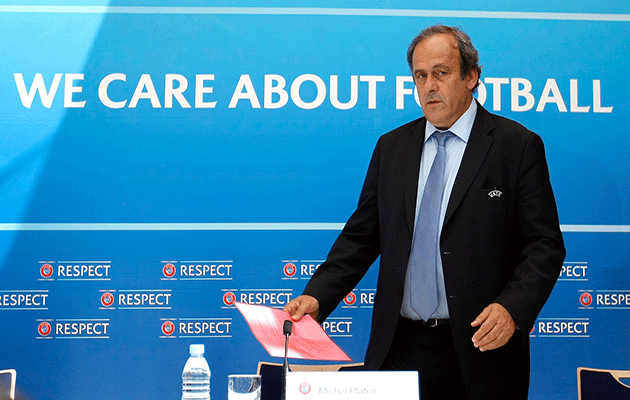Michel Platini, facing a possible criminal investigation, has attempted, at the third time of asking, to rescue his bid for world football power.
The French president of European federation UEFA had been running out of time and credibility after being questioned over a ‘disloyal payment’ from the world football federation.
Platini was named by Swiss investigators on Friday as recipient in 2011 of a suspicious payment of 2m SwFr authorised by FIFA president Sepp Blatter who has been declared the subject of a criminal investigation.
In two subsequent statements Platini, a contender for the FIFA presidency next February, insisted the payment had been an instalment due for work as Blatter’s football counsellor at FIFA between 1999 and 2002.
He refused, however, on both occasions to explain a nine-year delay in the payment, prompting speculation that it might have been linked with his simultaneous decision not to challenge Blatter for the FIFA presidency.
Platini was angered, in particular, by scepticism about the payment expressed in the French weekly France Football.
He sought to put the controversy to rest through an interview with the Agence France-Presse (AFP) agency.
Platini said: “I did not seek the payment quickly. I was employed by FIFA as an adviser to its president Joseph Blatter including everything concerning football-related issues such as the international calendar. It was a full-time job.
“As I explained to the Swiss authorities, I received a portion of the salary agreed at the time between 1998 and 2002 [but] Mr Blatter had told me early in my consulting work that it would not be possible to pay everything I was due immediately, because of the financial situation of FIFA at that time.
“Having never doubted that I would be paid eventually what was due to me, I had not chased payment [and] eventually asked FIFA to pay the balance due in 2011.”
FIFA’s accounts for 1999-2002 show a revenue surplus of 115m SwFr ($83m at the time) but the world federation was only just emerging from a financial crisis sparked by the collapse into bankruptcy of its long-time commercial partner ISL.
As for the specific date of payment, Platini continued: “The timing of the 2011 FIFA presidential election had absolutely nothing to do with it because I had never had the intention of being a candidate.
“In any case I was also extremely pleased to have just been re-elected for a new term as UEFA president at the UEFA Congress in Paris in March.”
In fact Platini’s latter comment contradicts the assertion from the Swiss investigators that the payment was made a month earlier in February 2011.
Platini pointed out that he had volunteered to explain himself to the FIFA Independent Ethics Chamber and expressed his “disappointment” with media speculation.
He said: “For a long time I knew I would suffer unfounded attacks and I am aware that this will go on until the FIFA election [next February 26].
“I’m just disappointed with the speculation of certain media, particularly a French tabloid, which speaks of ‘doubt’ about me. My integrity is beyond doubt. I have nothing about which to reproach myself.”
However, despite Platini’s protestations of innocence, the Swiss police remain unpersuaded.
Article 178, paragraph D of the Swiss criminal code under which he was quizzed on Friday allows for the questioning of “a person who is not an accused but who cannot be excluded as the perpetrator of or as a participant in the offence under investigation or another related offence.”
Attorney-General Michael Lauber, after addressing an event at Zurich University, underlined the legally vulnerable position of Platini by saying: “He is somewhere between being witness and accused.”
Lauber said that, if necessary, he would order a raid on Platini’s presidential office at UEFA’s offices at Nyon, east of Geneva. He added: “I will do anything to get at the real truth and I could not exclude that I also have to go there.”






